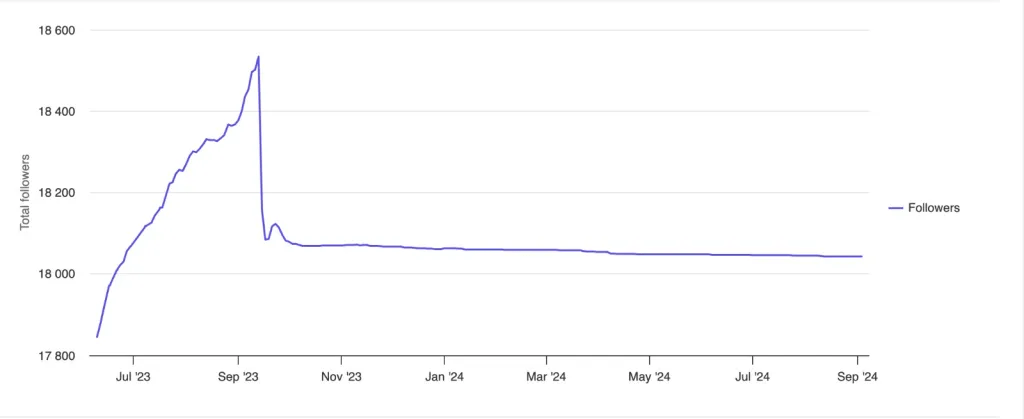Something unusual has just unfolded in Brazil, where authorities have uncovered a sprawling streaming fraud operation involving thousands of fake accounts and artificially generated plays. The scheme, which allegedly gamed music streaming platforms like Spotify and Deezer, was so sophisticated that it prompted Brazil’s Federal Police to launch a full-scale investigation.
The arrested individual has been charged with generating more than 28 million fake plays on streaming services by uploading approximately somewhere beyond 500 fake tracks to Spotify. Additionally, the investigation uncovered further instances of copyright infringement, revealing that 36 tracks were stolen from local composers through promotional WhatsApp groups.
Now, if you are curious about what the catch is here, well, these were not just bots boosting a bedroom producer’s ego. The fake plays led to millions in royalty payouts, with money siphoned from legitimate artists, all while manipulating global charts and discovery algorithms. Moreover, this was not even an isolated blip in the sense that it is part of a larger problem that has been creeping into the music industry for years.
If you’re an artist, a label representative, or just an ardent music lover, this story should raise your eyebrows! Therefore, moving forward, let us explain the concept of streaming fraud, how it works, why it’s a serious issue, and what one can do to prevent it.
So, what exactly is Streaming Fraud?
In precise terms, streaming fraud refers to the manipulation of music streaming platforms to artificially boost the number of plays a song receives. Even though it all sounds quite simple, the methods people use to do so are becoming increasingly elaborate.
Streaming fraud occurs when someone intentionally increases streaming numbers using illegitimate means, often to earn higher payouts or trick the algorithm into promoting a song. Sometimes, the artists themselves are not even involved in such activities, but third-party marketers or promoters may employ shady methods to boost a song’s performance.
Some methods rely on bots, which are basically automated accounts that are programmed to play a song on repeat. Others use click farms, where real people are paid to stream a track over and over again. Then, there are more tech-savvy methods that involve AI-generated songs or hacked accounts used to stream tracks without the user’s knowledge. Since it is not always easy to detect, that is what makes it extremely dangerous and, well, undoubtedly a threat.
A recent case in the U.S. highlights this even further. A musician was indicted for using AI tools to create fake songs and fraudulently collect more than $10 million in royalties. Well, that’s definitely not a rounding error, but rather enough money to fund an indie label for several years. Streaming fraud is increasingly becoming organized, global, and high stakes.
Why Is Streaming Fraud Harmful?
At first glance, it may not seem like a big issue. So what if someone bought a few extra streams? Aren’t music platforms smart enough to filter that out? Well, this is exactly where things turn into a huge mess.
Firstly, streaming fraud directly robs real artists of their earnings. Most streaming platforms operate on a pro-rata system, which means that all revenue from subscriptions and advertisements is pooled into a single large fund, which is then distributed among artists based on the total number of streams. If someone fakes their way to the top of that pile, they are literally taking a slice of the pie that belongs to someone else.
Secondly, streaming fraud messes with the charts and algorithms that shape what we listen to. Platforms like Spotify rely heavily on algorithms to recommend new music. If fake plays artificially boost the popularity of a song, it may feature in playlists or on the homepage, thereby overshadowing genuine talent. That means some deserving artist might miss their big break because a scammer gamed the system.
Moreover, it ruins the trust in the entire ecosystem where the fans assume that high play counts mean a song is popular. Labels and managers use data to inform career decisions, including where to tour, who to collaborate with, and which songs to promote. Therefore, if such actions distort that data, it leads to poor decisions, wasted resources, and missed opportunities.
And here’s the kicker!
Platforms often don’t announce when they detect fraud, which means that legitimate artists might receive punishment in the form of song removal or account banning without knowing what went wrong or who is responsible for the same.
So yes, streaming fraud is definitely harmful to the entire music industry; to listeners, and most importantly to the artists who are trying to make an honest living out of their sincere efforts.
Can you prevent Streaming Fraud?
A very important question, but the hard truth is that there is no silver bullet. But there are definitely a few things that artists and teams can do to stay on the right side of the line.
1. Avoid shady services
This one is pretty obvious but still worth repeating. If someone promises “10,000 plays for $20” or “guaranteed playlist placement,” run the other way. Quite often, bots or click farms power these services, and the short-term bump is never worth the long-term risk.
2. Check your marketing partners
Even legitimate-looking agencies can be up to no good. Therefore, before hiring a promoter or playlisting service, do your homework. Ask for references and thoroughly verify their past records with other artists, as transparency is crucial.
3. Keep track of your own data
Regularly monitor your streaming reports. Sudden, unexplained spikes, especially those that come from countries that do not fall under your target, can certainly be a red flag. So, if something looks suspicious, report it early. The sooner you flag a problem, the easier it is to correct it.
4. Understand the rules of the platform
Most digital service providers (DSPs) have strict guidelines regarding what constitutes fraudulent activity. Get familiar with them. Spotify, Apple Music, and Amazon all have their own terms, and ignorance is definitely not a defense.
5. Focus on organic growth
It’s slower, sure. However, building a fan base the right way through social media, live shows, community engagement, email lists, and other methods will always be more sustainable. Always remember that real fans don’t just stream, but they also support, share, and show up to your gigs.
6. Learn to identify botted playlists
Take a look at the total number of followers listed for the playlist. Then, go to the individual songs and take a look at their streaming count. With over 50k followers, if a playlist is hosting songs with less than 1000 streams then it is a clear indication of the playlist being booted. In an authentic playlist, streams will always outnumber followers, because songs tend to be played multiple times by listeners. These bots don’t actually engage with the music – they’re just inflating the numbers.

The Bottom Line
The Brazilian streaming fraud case may seem distant, but it’s part of a growing problem that affects the entire global music ecosystem. As technology evolves and AI tools become more accessible, the temptation to game the system will only grow. But so will the scrutiny. So for every artist out there grinding honestly, every music lover who values authenticity, and every fan who wants their favorite artists to succeed, THIS matters!
Therefore, streaming fraud is, plain and simple, theft, and the more we discuss it, the harder it becomes for scammers to thrive in the shadows. So, if you’re an artist, take this as a reminder to keep your house clean. If you’re a listener, let this be your reason to dig deeper into the music you support.
Also read: NAMM 2025 : The Best Music Equipments and Accessories of This Year
Writer by the day, musician by night!












